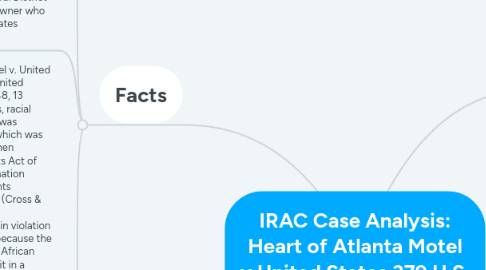IRAC Case Analysis: Heart of Atlanta Motel v.United States 379 U.S. 241 (1964)
by Jason Hartley

1. Facts
1.1. The parties involved were the owner of the Heart of Atlanta Motel, the American Americans being discriminated against, Congress, the Federal District Court and the United States Supreme Court.
1.2. Procedural History: The Civil Rights Act of 1964 made it illegal for the motel owner to discriminate against African Americans because his business was engaged in interstate commerce. The owner brought a suit to a Federal District Court claiming that the Civil Rights Act was unconstitutional, and that Congress exceeded its power. The motel owner claimed that it was not engaged in interstate commerce. The Federal District Court ruled against the motel owner who then appealed to the United States Supreme Court.
1.3. Summary: Heart of Atlanta Motel v. United States. Supreme Court of the United States, 379 U.S. 241, 85 S.Ct. 348, 13 L.Ed.2d 258 (1964). In the 1950s, racial segregation and discrimination was prevalent in the United States which was found to be unconstitutional when Congress passed the Civil Rights Act of 1964 which prohibited discrimination backed on race in “establishments affecting interstate commerce” (Cross & Miller, 2018). The Heart of Atlanta Motel was in violation of the Civil Rights Act of 1964 because the owner refused to rent rooms to African Americans. The owner filed a suit in a federal district court claiming that the Civil Rights Act of 1964 was unconstitutional stating that Congress had exceeded its constitutional power (Cross & Miller, 2018).The motel owner’s argument revolved around the notion that the motel was not engaged in interstate commerce. The district court ruled that the Civil Rights Act did not violate the constitution and the motel owner filed an appeal that went to the United States Supreme Court.
2. Issue
2.1. The legal question put before the court is to determine if “Congress exceeded its constitutional power to regulate commerce by enacting the Civil Rights Act of 1964” (Cross & Miller, 2018).
3. Rule of Law
3.1. The legal principle and precedents that the U.S. Supreme Court will consider are the Civil Rights Act of 1964 and the finding of the Federal District Court. Further, although the Civil Rights Acts had no other precedents, the record of it passing in the House of Representatives and the Senate included significant evidence regarding how discrimination can impact interstate commerce (Cross & Miller, 2018).
4. Analysis/Application
4.1. The plaintiff, the owner of Heart of Atlanta Motel, argued two main points: 1) The Civil Rights Act of 1964 was unconstitutional and Congress overstepped its power by voting it into law. 2) The motel does not engage in interstate commerce.
4.2. The defendant in this case is the United States of America and, in Federal District Court, it was found that Congress had acted within its power when enacting the Civil Rights Act of 1964. The plaintiff then appealed, and the case went to the United States Supreme Court. The Civil Rights Act and Federal District Court decision was up held on the basis that Congress acted within its power and that the act was constitutional. It was argued that the Civil Rights Act did regulate discrimination affecting interstate commerce and that the Heart of Atlanta Motel was engaged in interstate commerce.
4.3. Court: The United States Supreme Court is the highest court in the nation. The court ruled that Congress acted within its power in creating the Civil Rights Action of 1964 and more specifically the clause regulating discrimination as it relates to interstate commerce. Further, Justice Clarke found that the motel was engaged in interstate commerce. Some compelling facts were that the motel advertised nationally and was not “of a purely local character” as 75 percent of guests were residents of other states. From evidence brought forth during the Civil Rights Act’s passage through Congress, Justice Clarke states that African Americans are discriminated against in ways that limit their ability to travel and that this directly and negatively impacts interstate commerce. Justice Clarke added with emphasis that “if it is interstate commerce that feels the pinch, it does not matter how local the operation that applies the squeeze” (Cross & Miller, 2018).
5. Conclusion
5.1. Impact: The impact of this verdict was that it validated the Civil Rights Act of 1964 and we continued to prohibit discrimination based on race, color, national origin, religion or gender.
5.2. Importance: This is important from a business perspective because this creates precedent and understand of how businesses must comply with this act as it relates to not only discrimination but also interstate commerce.
5.3. Influence: The verdict of this case carries significant influence not only because it sets a precedent/stare decisis, but also because if the Supreme Court had ruled in favor of the Plaintiff, the legal landscape in the United States would likely be entirely different today. Discrimination would have continued to occur at alarming rates.
6. References
6.1. Cross, F., & Miller, R. (2018). The legal environment of business (10th ed). Stamford, CT: Cengage.
7. Jason Hartley


